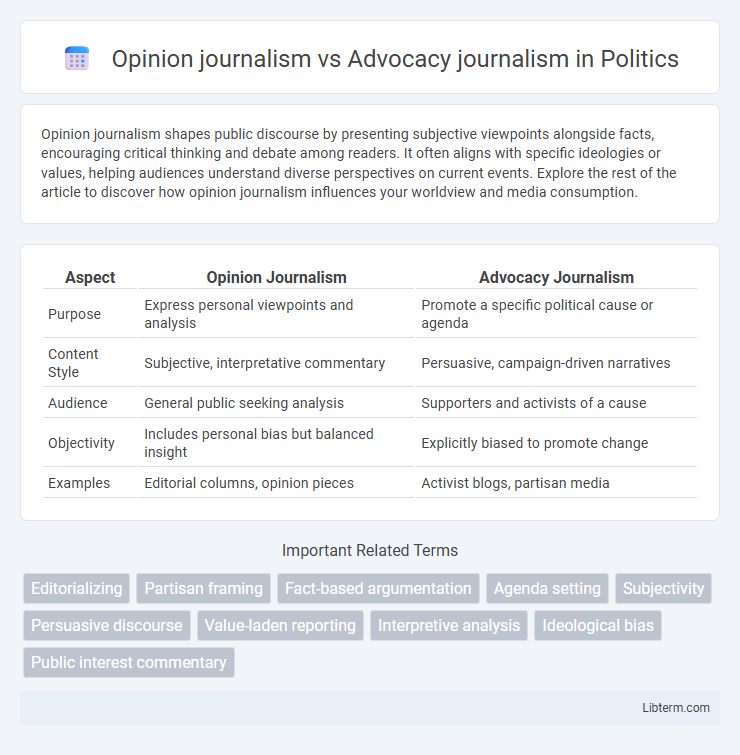Opinion journalism shapes public discourse by presenting subjective viewpoints alongside facts, encouraging critical thinking and debate among readers. It often aligns with specific ideologies or values, helping audiences understand diverse perspectives on current events. Explore the rest of the article to discover how opinion journalism influences your worldview and media consumption.
Table of Comparison
| Aspect | Opinion Journalism | Advocacy Journalism |
|---|---|---|
| Purpose | Express personal viewpoints and analysis | Promote a specific political cause or agenda |
| Content Style | Subjective, interpretative commentary | Persuasive, campaign-driven narratives |
| Audience | General public seeking analysis | Supporters and activists of a cause |
| Objectivity | Includes personal bias but balanced insight | Explicitly biased to promote change |
| Examples | Editorial columns, opinion pieces | Activist blogs, partisan media |
Defining Opinion Journalism
Opinion journalism provides subjective analysis and personal viewpoints on current events, often reflecting the writer's beliefs or interpretations rather than just factual reporting. It is characterized by editorial pieces, columns, and op-eds that aim to influence public opinion through persuasive language and argumentative structure. Unlike advocacy journalism, which explicitly promotes a particular cause or agenda, opinion journalism can offer a broader range of perspectives while still emphasizing the writer's individual stance.
What Is Advocacy Journalism?
Advocacy journalism is a form of reporting that intentionally promotes a specific political or social cause, aiming to influence public opinion and inspire action. Unlike opinion journalism, which primarily expresses personal viewpoints, advocacy journalism combines factual reporting with persuasive messaging to highlight underrepresented perspectives. This approach prioritizes transparency about its agenda, blending storytelling with activism to effect change within society.
Historical Evolution of Both Genres
Opinion journalism emerged prominently in the early 20th century, characterized by newspapers and magazines providing editorials that reflected authors' perspectives without masking bias. Advocacy journalism developed alongside, gaining momentum during the 1960s civil rights movement as journalists explicitly aligned with causes, aiming to influence public opinion and policy. Both genres evolved through technological advances and shifting media landscapes, with opinion journalism maintaining interpretive analysis and advocacy journalism intensifying its role in championing social justice.
Comparing Core Principles
Opinion journalism centers on personal viewpoints and subjective analysis, emphasizing the journalist's interpretation of events while maintaining factual accuracy. Advocacy journalism actively promotes specific social or political causes, using reporting to influence public opinion and encourage action toward particular outcomes. Both forms engage with public discourse, but opinion journalism prioritizes individual perspective whereas advocacy journalism commits to advancing agenda-driven narratives.
Objectivity vs. Persuasion
Opinion journalism emphasizes subjective analysis and personal viewpoints, often blending facts with the journalist's perspectives to influence readers' beliefs. Advocacy journalism prioritizes persuading the audience by promoting specific causes or ideologies, sometimes at the expense of strict objectivity. Objectivity in opinion journalism strives for balanced argumentation, whereas advocacy journalism embraces partiality to achieve social or political change.
The Role of Bias in Each Approach
Opinion journalism embraces bias as a deliberate tool to express personal viewpoints and persuade audiences, often blurring lines between facts and subjective interpretation. Advocacy journalism explicitly incorporates bias to promote specific causes or social agendas, prioritizing activism over impartiality. Both approaches acknowledge bias openly, contrasting with traditional journalism's aim for objectivity and balanced reporting.
Influence on Public Discourse
Opinion journalism shapes public discourse by presenting subjective viewpoints that encourage debate and reflection, often influencing audience attitudes through persuasive narratives. Advocacy journalism actively seeks to promote specific causes or policy changes, driving public engagement and mobilizing support by emphasizing particular social or political issues. Both forms impact the democratic process by framing issues in ways that can sway public opinion and policy discussions.
Audience Engagement and Trust
Opinion journalism fosters audience engagement by encouraging critical thinking through diverse perspectives, enhancing trust when transparency about biases is maintained. Advocacy journalism drives strong emotional connections by championing specific causes, which can deepen trust among like-minded audiences but may limit broader credibility. Balancing factual accuracy with persuasive storytelling is crucial in both to sustain long-term audience loyalty and trust.
Ethical Challenges and Responsibilities
Opinion journalism involves expressing subjective perspectives while upholding ethical standards such as accuracy, fairness, and transparency to maintain credibility. Advocacy journalism actively promotes specific causes or viewpoints, raising ethical concerns about bias, factual distortion, and the potential compromise of journalistic objectivity. Both forms share the responsibility to distinguish opinion from fact clearly, ensuring audiences can critically evaluate the information presented.
Future Trends in Journalism Narratives
Future trends in journalism narratives indicate a growing convergence between opinion journalism and advocacy journalism, as digital platforms amplify personalized content that blurs traditional boundaries. Advances in AI-driven content curation and audience analytics will increasingly tailor narratives to align with readers' values, intensifying the impact of advocacy within opinion pieces. Ethical frameworks and transparency standards are expected to evolve to address challenges posed by this hybridization, ensuring credibility while embracing diverse perspectives.
Opinion journalism Infographic

 libterm.com
libterm.com